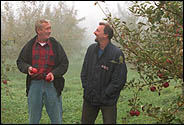kaleidoscope
Bleho & Laplaine: Field marshals
 Jean-Pierre Laplaine and Mike Bleho
Jean-Pierre Laplaine and Mike BlehoPHOTO: Owen Egan |
|
J-P uses a hockey analogy to describe his relationship with Mike. "On a hockey team, the young guy shoots and scores. If you are numero uno, you've got to keep up."
And Mike, the young guy, would agree that the old star has. After working with Jean-Pierre Laplaine for the past 15 years, Mike Bleho maintains that "J-P has taught me everything I know.
"He's an institution. He's so good for this place," continues Bleho, technician in horticultural services. "I learned how to work on a farm, how to use the machinery, how to plant, and I learned the Mac way, which was the J-P way."
J-P, as in Jean-Pierre Laplaine, senior technician in horticultural services and 30-year veteran of the Macdonald Campus orchards and fruit and vegetable gardens, counters that he's learned just as much from the upstart with the diploma.
"He was a motivation for me. It was always, 'Hey, J-P, let's go to this conference, check out this article.' There was no jealousy between us."
While only 10 years separates the two men, there seems to be a father-son sort of rapport and much affection between the two. Laplaine is an almost completely self-taught farmer. Growing up on Ile Perrot, he would earn money during summers picking beans for two dollars a day. Once hired at Mac, he began taking or auditing the diploma courses that he considered useful to his work.
Bleho, on the other hand, had worked summers on the farm while a student in the farm management diploma program. After working elsewhere, he came back in 1984, to see J-P. He was hired for the apple season and never left.
Like Laplaine, Bleho wasn't raised on a farm but working the earth was part of his upbringing. Growing up in Beaconsfield as one of seven children, Bleho got his taste for growing things from his father, a Slovak immigrant who worked in real estate and raised fruit trees for pleasure. Father taught son how to graft. Now Mike Bleho demonstrates tree grafting to students.
One person who greatly appreciates Laplaine and Bleho is plant science professor Katrine Stewart. "They have the knack of taking experimental designs that we put together and translating them into field plots, caring for them and helping with data recording. I truly think that my time at McGill would have been not half so much fun nor as productive without having these two as my associates."
Beyond overseeing the running of the 34-acre Mac farm, not to mention the running of the Mac Market from August through November, there is the job of working with farmers from the area. Bleho is responsible for the annual evaluation of new cultivators of Solanacae (tomatoes, peppers and eggplants) and Cucerbitacae (cucumbers, melons, squash and pumpkins).
"We take care of the controls with the Ministry of Agriculture," says Bleho, explaining that the ministry conducts evaluations of all the new cultivators in order to help growers decide which tomato seeds, for instance, to choose next year. "McGill wants us to be closer to producers," says Laplaine, who is responsible for trying new cultivators of apples such as the popular New Zealand native, the Gala.
"In the old days, Mac was big in the community, but somewhere along the way we lost it. I'm glad that we're doing this again," adds Bleho. "We're the liaison between the university, the producers and the government."
When it comes to leisure, Bleho picks up his guitar. For many years he sang and played with the blues band The Ministry of Truth, but now, with two young boys and being "too old to jump around," he plays duo and trio folk gigs. Laplaine's leisure is working in his own garden on Ile Perrot and tending to the many tasks of maintenance that home and pool require.
Both Bleho and Laplaine are united in enjoying working outdoors from February, when they prune the 2,500 apple trees, through November, when the last of the squash and leeks are harvested and it's time to plough in the fields. "I'm happy as soon as the sun starts to get big. I love that growing season," says Bleho.
Laplaine continues: "In May and June, you're an optimist, taking a bare field and making something out of it."
 |
||||
|
I dread going to class. I think it's such an impediment to me being able to learn. Things are way too guided. |
||||
Halloween dissected
 |
|
Academics can analyze just about anything if given the opportunity. Halloween is no exception.
The Chronicle of Higher Education recently invited scholars to offer their deep thoughts about the night of little ghouls and cavities in the making.
Princeton religion professor Leigh Eric Schmidt, author of Consumer Rites: The Buying and Selling of American Holidays, offers the gloomy insight that Halloween is a crash course in materialism for young ones. "The shopping bag is the trick-or-treat symbol. It's appropriate that way: little shoppers in the making."
Arizona State University Jewish studies professor Jack Kugelmass, author of Masked Culture: The Greenwich Village Halloween Parade, notes, "We live in an age when we all feel that we can be whoever we want to be. This is a holiday that celebrates that. It says that you have the licence to imagine yourself as whoever you want to be, and it's a licence to play with the darker, more macabre aspects of your personality."
He adds, "Halloween is an extremely important holiday for gay people because of the celebration of dress-up. This is a holiday of transgression -- the whole point of dress-up is to transgress rigid categories."
Pennsylvania State University history professor Gary Cross, author of Kids' Stuff: Toys and the Changing World of American Childhood, says Halloween has lost much of its darker edge over the years.
"When I was a child, part of what Halloween was about was an implicit threat of young people out in the community demanding a treat or they would do a trick on you -- move your outhouse, let your animals out of the barn, put wax on your windows.
"But what's happened with Halloween, as with all holidays, is that its pagan and very often threatening qualities have been shorn, and the holiday has become bowdlerized. It's become a celebration of childhood and childhood innocence."
 |
||||
|
Running for the NDP in Quebec is not something you do if you're power hungry. I'm running to start a dialogue. |
||||
Our man at The Globe
 James Bonk
James BonkPHOTO: Owen Egan |
|
Browsing around the Internet one day, East Asian studies student James Bonk stumbled upon a unique part-time job possibility and threw his hat into the ring, thinking he didn't have a chance.
The Globe and Mail was developing a new web site, globeandmail.com/campus, geared to Canadian university students and they were searching for 10 students from across the country to serve as reporters, maintaining web sites with stories about their respective universities.
Guess who will be filing reports about McGill?
Impressed by his sample article about the Folk Music Club, the Globe will be arming Bonk with a digital camera to snap shots and unleashing him on McGill.
A first-year student, Bonk says his new gig "will force me to get to know the University." The Globe folks want sports coverage, information on interesting visitors to McGill, and articles about noteworthy student activities.
"One aspect of McGill that I'm already enjoying is the variety and the cosmopolitan nature of the place. I studied at the University of Manitoba and everybody there seems to be from Winnipeg."
A frequent traveller and journal-keeper (hence the interest in writing), Bonk is back from a year spent teaching English in China.
"Travel really shatters your expectations of a place," says Bonk, noting that Beijing was much dirtier and drabber than he expected and the students there were surprisingly open about their criticisms of the government.
Another lesson learned: don't eat meat you can't identify. After dining on a mystery meal in one Chinese restaurant, Bonk noticed a truck with dog carcasses parked outside. "I felt nauseated after that."

